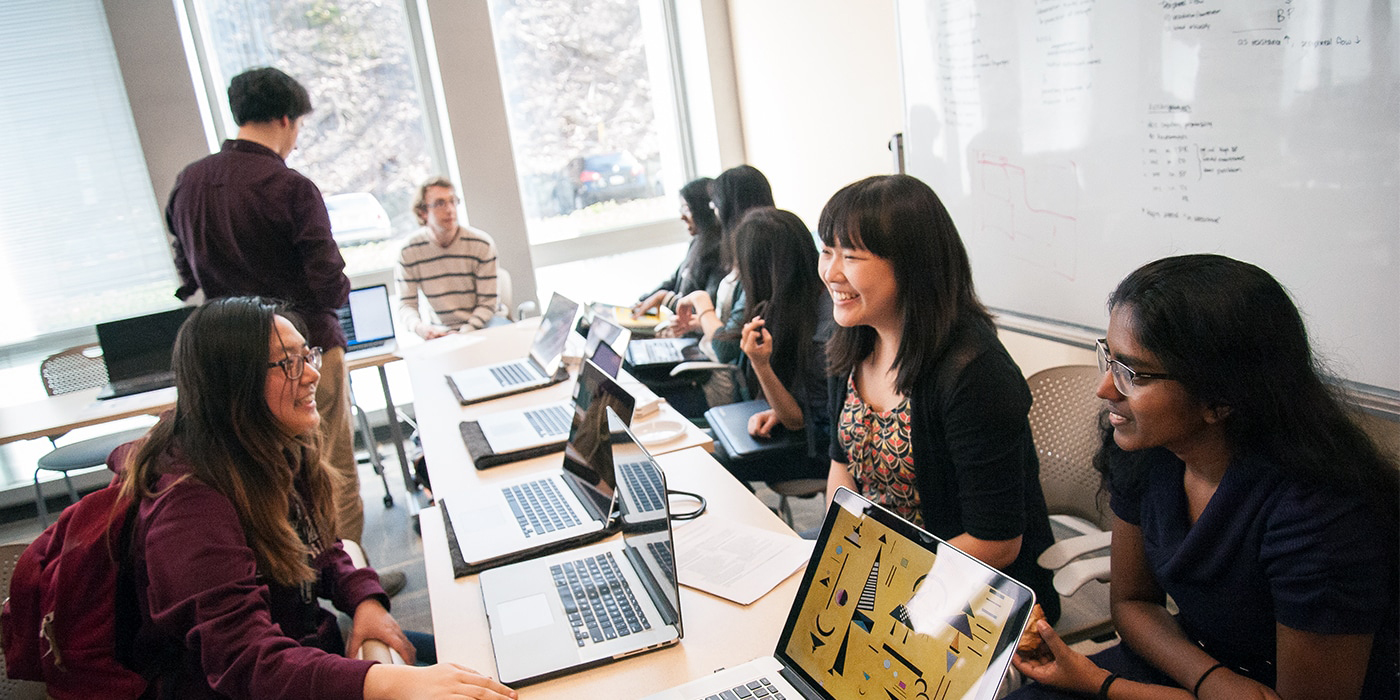GAITAR Fellows | Project Descriptions
GAITAR Fellows Project Descriptions Filtered by Projects with Data
Writing, Reading, Communication Skills
Explore studies examining generative AI’s potential role in students’ writing, reading, and communication development; in how it might influence students’ writing quality, multilingual learning, reading analysis, and speaking performance.
- To what extent does genAI usage and scaffolding impact the quality of a student writing deliverable?
Emily DeJeu
[READ STUDY] - To what extent does the use of two different applications of generative AI impact students’ second language writing?
Sébastien Dubreil
[READ STUDY] - To what extent does student use of generative AI while completing formal writing assignments impact students’ writing performance?
Rebekah Fitzsimmons
[READ STUDY] - To what extent does generative AI impact research and writing efficiency and performance?
Jordan Usdan
[READ STUDY] - To what extent does student use of generative AI impact the rate of change in students’ abilities to critically read and analyze academic papers?
Liz Walker and Bonnie Youngs
[READ STUDY] - To what extent does the use of generative AI for text analysis impact students’ knowledge of genre-specific discourse and linguistic features?
Jungwan Yoon
[READ STUDY] - To what extent does genAI impact novice students’ speaking performance compared to practicing with peers?
Bo Zhan
[READ STUDY]
Feedback, Revision, Evaluation
Explore studies examining the peer, expert, vs generative AI for providing feedback; and the potential influence on students’ revision quality, design completeness, or performance on subsequent tasks.
- To what extent does type of feedback interaction (peer vs generative AI) impact the quality of revisions of interview protocols?
Brandon Bodily
[READ STUDY] - To what extent does the use of generative AI tools improve the student peer review process for students in an intermediate level undergraduate writing course?
Alan Thomas Kohler
[READ STUDY] - To what extent does the quality of student-designed interview protocols differ when feedback on first drafts comes from an expert as compared to generative AI?
Marti Louw
[READ STUDY] - To what extent does the source of feedback affect performance on a future assignment?
Raja Sooriamurthi and Xiaoying Tu
[READ STUDY] - To what extent does using generative AI as a feedback generator improve the quality of student design deliverables in terms of completeness and correctness?
Rafal Wlodarski
[READ STUDY]
Creativity, Design, Ideation
Explore studies examining students’ use of generative AI for brainstorming and idea generation as well as creative production and control.
- To what extent does student use of generative AI tools to make animations impact the technical and aesthetic control over their art?
Scott Andrew
[READ STUDY] - To what extent does student use of generative AI while creating micro lessons affect the quality of their lesson designs?
Steven Moore
[READ STUDY] - To what extent does brainstorming with the assistance of generative AI impact the number and quality of ideas generated?
Carrington Motley
[READ STUDY]
Cultural Understanding, Collaboration, Group Processes
Read studies examining GenAI’s role in cultural interpretation, perspectives on biases, and consensus-building.
- To what extent does engaging with a genAI activity on ancient Egyptian culture change students’ attitudes toward cultural biases, historiography, and the humanities?
Laura DeLuca
[READ STUDY] - To what extent does introducing a Critical GenAI Studies lens in a writing course on art and culture affect students’ views of AI-generated images of CMU culture and their performance on interpretative essays?
Catherine Evans
[READ STUDY] - To what extent does students’ interaction with a consensus-building genAI tool affect perceptions of a group decision task?
Ganesh Mani
[READ STUDY]
Other Disciplinary Skills
Browse studies examining the impact of students’ development of other disciplinay skills when using generative AI.
- To what extent does the early introduction and scaffolded use of generative AI tools for learning Tableau impact students’ performance on course deliverables?
Gabriela Gongora-Svartzman
[READ STUDY] - To what extent does debating with generative AI (as compared to debating with a peer) impact students’ development of analytical reasoning skills (i.e., argumentation and evaluation)?
Derek Leben
[READ STUDY] - To what extent does the use of genAI as a tutee improve students' mastery of key concepts?
Christopher McComb
[READ STUDY] - To what extent does the use of generative AI as a scaffolded study partner impact the learning outcomes of non-majors when exposed to a new chemistry topic?
Nimer Murshid
[READ STUDY] - To what extent does utilization of AI tools impact students’ skills for data processing, cleaning, and visualization of large data sets?
Fethiye Ozis
[READ STUDY] - To what extent does using genAI affect students’ industry knowledge as communicated through a team Miro board and a Q&A session with the instructor?
Omid Saadati
[READ STUDY] - To what extent does using generative AI to complete an assignment impact students’ ability to engage in critical thinking?
Peter Zhang
[READ STUDY]
GAITAR Fellows Project Descriptions Filtered by College
College of Engineering
- To what extent does type of feedback interaction (peer vs generative AI) impact the quality of revisions of interview protocols?
Bodily, Bandon
[READ STUDY] - To what extent does the use of genAI as a tutee improve students' mastery of key concepts?
McComb, Christopher
[READ STUDY] - To what extent does utilization of AI tools impact students’ skills for data processing, cleaning, and visualization of large data sets?
Ozis, Fethiye
[READ STUDY] - To what extent does using genAI affect students’ industry knowledge as communicated through a team Miro board and a Q&A session with the instructor?
Saadati, Omid
[READ STUDY] - To what extent does using generative AI as a feedback generator improve the quality of student design deliverables in terms of completeness and correctness?
Wlodarski, Rafal
[READ STUDY]
Dietrich College of Humanities & Social Sciences
- To what extent does engaging with a genAI activity on ancient Egyptian culture change students’ attitudes toward cultural biases, historiography, and the humanities?
DeLuca, Laura
[READ STUDY] - To what extent does the use of two different applications of generative AI impact students’ second language writing?
Dubreil, Sébastien
[READ STUDY] - To what extent does introducing a Critical GenAI Studies lens in a writing course on art and culture affect students’ views of AI-generated images of CMU culture and their performance on interpretative essays?
Evans, Catherine
[READ STUDY] - To what extent does the use of generative AI tools improve the student peer review process for students in an intermediate level undergraduate writing course?
Kohler, Alan Thomas
[READ STUDY] - To what extent does student use of generative AI impact the rate of change in students’ abilities to critically read and analyze academic papers?
Walker, Liz & Youngs, Bonnie
[READ STUDY] - To what extent does the use of generative AI for text analysis impact students’ knowledge of genre-specific discourse and linguistic features?
Yoon, Jungwan
[READ STUDY] - To what extent does genAI impact novice students’ speaking performance compared to practicing with peers?
Zhan, Bo
[READ STUDY]
Heinz College of Information Systems & Public Policy
- To what extent does student use of generative AI while completing formal writing assignments impact students’ writing performance?
Fitzsimmons, Rebekah
[READ STUDY] - To what extent does the early introduction and scaffolded use of generative AI tools for learning Tableau impact students’ performance on course deliverables?
Gongora-Svartzman, Gabriela
[READ STUDY] - To what extent does the source of feedback affect performance on a future assignment?
Sooriamurthi, Raja & Tu, Xiaoying
[READ STUDY] - To what extent does generative AI impact research and writing efficiency and performance?
Usdan, Jordan
[READ STUDY] - To what extent does using generative AI to complete an assignment impact students’ ability to engage in critical thinking?
Zhang, Peter
[READ STUDY]
Mellon College of Science
- To what extent does the use of generative AI as a scaffolded study partner impact the learning outcomes of non-majors when exposed to a new chemistry topic?
Murshid, Nimer
[READ STUDY]
School of Computer Science
- To what extent does the quality of student-designed interview protocols differ when feedback on first drafts comes from an expert as compared to generative AI?
Louw, Marti
[READ STUDY] - To what extent does student use of generative AI while creating micro lessons affect the quality of their lesson designs?
Moore, Stephen
[READ STUDY]
Tepper School of Business
- To what extent does genAI usage and scaffolding impact the quality of a student writing deliverable?
DeJeu, Emily
[READ STUDY] - To what extent does debating with generative AI (as compared to debating with a peer) impact students’ development of analytical reasoning skills (i.e., argumentation and evaluation)?
Leben, Derek
[READ STUDY] - To what extent does students’ interaction with a consensus-building genAI tool affect perceptions of a group decision task?
Mani, Ganesh
[READ STUDY] - To what extent does brainstorming with the assistance of generative AI impact the number and quality of ideas generated?
Motley, Carrington
[READ STUDY]
College of Fine Arts
- To what extent does student use of generative AI tools to make animations impact the technical and aesthetic control over their art?
Andrew, Scott
[READ STUDY]
GAITAR Fellows Project Descriptions Filtered by Course Level
Intro Undergraduate
- To what extent does type of feedback interaction (peer vs generative AI) impact the quality of revisions of interview protocols?
Bodily, Bandon
[READ STUDY] - To what extent does engaging with a genAI activity on ancient Egyptian culture change students’ attitudes toward cultural biases, historiography, and the humanities?
DeLuca, Laura
[READ STUDY] - To what extent does introducing a Critical GenAI Studies lens in a writing course on art and culture affect students’ views of AI-generated images of CMU culture and their performance on interpretative essays?
Evans, Catherine
[READ STUDY] - To what extent does the use of generative AI tools improve the student peer review process for students in an intermediate level undergraduate writing course?
Kohler, Alan Thomas
[READ STUDY] - To what extent does the use of genAI as a tutee improve students' mastery of key concepts?
McComb, Christopher
[READ STUDY] - To what extent does the use of generative AI as a scaffolded study partner impact the learning outcomes of non-majors when exposed to a new chemistry topic?
Murshid, Nimer
[READ STUDY] - To what extent does the source of feedback affect performance on a future assignment?
Sooriamurthi, Raja & Tu, Xiaoying
[READ STUDY] - To what extent does student use of generative AI impact the rate of change in students’ abilities to critically read and analyze academic papers?
Walker, Liz & Youngs, Bonnie
[READ STUDY] - To what extent does the use of generative AI for text analysis impact students’ knowledge of genre-specific discourse and linguistic features?
Yoon, Jungwan
[READ STUDY] - To what extent does genAI impact novice students’ speaking performance compared to practicing with peers?
Zhan, Bo
[READ STUDY]
Advanced Undergraduate
- To what extent does student use of generative AI tools to make animations impact the technical and aesthetic control over their art?
Andrew, Scott
[READ STUDY] - To what extent does genAI usage and scaffolding impact the quality of a student writing deliverable?
DeJeu, Emily
[READ STUDY] - To what extent does the use of two different applications of generative AI impact students’ second language writing?
Dubreil, Sébastien
[READ STUDY] - To what extent does debating with generative AI (as compared to debating with a peer) impact students’ development of analytical reasoning skills (i.e., argumentation and evaluation)?
Leben, Derek
[READ STUDY] - To what extent does the quality of student-designed interview protocols differ when feedback on first drafts comes from an expert as compared to generative AI?
Louw, Marti
[READ STUDY] - To what extent does brainstorming with the assistance of generative AI impact the number and quality of ideas generated?
Motley, Carrington
[READ STUDY] - To what extent does utilization of AI tools impact students’ skills for data processing, cleaning, and visualization of large data sets?
Ozis, Fethiye
[READ STUDY]
Graduate
- To what extent does student use of generative AI while completing formal writing assignments impact students’ writing performance?
Fitzsimmons, Rebekah
[READ STUDY] - To what extent does the early introduction and scaffolded use of generative AI tools for learning Tableau impact students’ performance on course deliverables?
Gongora-Svartzman, Gabriela
[READ STUDY] - To what extent does students’ interaction with a consensus-building genAI tool affect perceptions of a group decision task?
Mani, Ganesh
[READ STUDY] - To what extent does student use of generative AI while creating micro lessons affect the quality of their lesson designs?
Moore, Stephen
[READ STUDY] - To what extent does using genAI affect students’ industry knowledge as communicated through a team Miro board and a Q&A session with the instructor?
Saadati, Omid
[READ STUDY] - To what extent does generative AI impact research and writing efficiency and performance?
Usdan, Jordan
[READ STUDY] - To what extent does using generative AI as a feedback generator improve the quality of student design deliverables in terms of completeness and correctness?
Wlodarski, Rafal
[READ STUDY] - To what extent does using generative AI to complete an assignment impact students’ ability to engage in critical thinking?
Zhang, Peter
[READ STUDY]
GAITAR Fellows Project Descriptions Filtered by Course Size
Small (20 or fewer students)
- To what extent does student use of generative AI tools to make animations impact the technical and aesthetic control over their art?
Andrew, Scott
[READ STUDY] - To what extent does type of feedback interaction (peer vs generative AI) impact the quality of revisions of interview protocols?
Bodily, Bandon
[READ STUDY] - To what extent does engaging with a genAI activity on ancient Egyptian culture change students’ attitudes toward cultural biases, historiography, and the humanities?
DeLuca, Laura
[READ STUDY] - To what extent does the use of two different applications of generative AI impact students’ second language writing?
Dubreil, Sébastien
[READ STUDY] - To what extent does introducing a Critical GenAI Studies lens in a writing course on art and culture affect students’ views of AI-generated images of CMU culture and their performance on interpretative essays?
Evans, Catherine
[READ STUDY] - To what extent does the use of generative AI tools improve the student peer review process for students in an intermediate level undergraduate writing course?
Kohler, Alan Thomas
[READ STUDY] - To what extent does the quality of student-designed interview protocols differ when feedback on first drafts comes from an expert as compared to generative AI?
Louw, Marti
[READ STUDY] - To what extent does the use of generative AI as a scaffolded study partner impact the learning outcomes of non-majors when exposed to a new chemistry topic?
Murshid, Nimer
[READ STUDY] - To what extent does utilization of AI tools impact students’ skills for data processing, cleaning, and visualization of large data sets?
Ozis, Fethiye
[READ STUDY] - To what extent does the use of generative AI for text analysis impact students’ knowledge of genre-specific discourse and linguistic features?
Yoon, Jungwan
[READ STUDY]
Medium (21-50 students)
- To what extent does genAI usage and scaffolding impact the quality of a student writing deliverable?
DeJeu, Emily
[READ STUDY] - To what extent does student use of generative AI while completing formal writing assignments impact students’ writing performance?
Fitzsimmons, Rebekah
[READ STUDY] - To what extent does the early introduction and scaffolded use of generative AI tools for learning Tableau impact students’ performance on course deliverables?
Gongora-Svartzman, Gabriela
[READ STUDY] - To what extent does the use of genAI as a tutee improve students' mastery of key concepts?McComb, Christopher
[READ STUDY] - To what extent does student use of generative AI while creating micro lessons affect the quality of their lesson designs?
Moore, Stephen
[READ STUDY] - To what extent does using genAI affect students’ industry knowledge as communicated through a team Miro board and a Q&A session with the instructor?
Saadati, Omid
[READ STUDY] - To what extent does the source of feedback affect performance on a future assignment?
Sooriamurthi, Raja & Tu, Xiaoying
[READ STUDY] - To what extent does generative AI impact research and writing efficiency and performance?
Usdan, Jordan
[READ STUDY] - To what extent does student use of generative AI impact the rate of change in students’ abilities to critically read and analyze academic papers?
Walker, Liz & Youngs, Bonnie
[READ STUDY] - To what extent does using generative AI as a feedback generator improve the quality of student design deliverables in terms of completeness and correctness?
Wlodarski, Rafal
[READ STUDY] - To what extent does genAI impact novice students’ speaking performance compared to practicing with peers?
Zhan, Bo
[READ STUDY] - To what extent does using generative AI to complete an assignment impact students’ ability to engage in critical thinking?
Zhang, Peter
[READ STUDY]
Large (more than 50 students)
- To what extent does debating with generative AI (as compared to debating with a peer) impact students’ development of analytical reasoning skills (i.e., argumentation and evaluation)?
Leben, Derek
[READ STUDY] - To what extent does students’ interaction with a consensus-building genAI tool affect perceptions of a group decision task?
Mani, Ganesh
[READ STUDY] - To what extent does brainstorming with the assistance of generative AI impact the number and quality of ideas generated?
Motley, Carrington
[READ STUDY]
GAITAR Fellows Project Descriptions - Alphabetical List by Instructor Last Name
- Andrew, Scott: Art, College of Fine Arts
To what extent does student use of generative AI tools to make animations impact the technical and aesthetic control over their art?
[READ STUDY] - Bodily, Bandon: College of Engineering
To what extent does type of feedback interaction (peer vs generative AI) impact the quality of revisions of interview protocols?
[READ STUDY] - DeJeu, Emily: Tepper School of Business
To what extent does genAI usage and scaffolding impact the quality of a student writing deliverable?
[READ STUDY] - DeLuca, Laura: Dietrich College of Humanities and Social Sciences
To what extent does engaging with a genAI activity on ancient Egyptian culture change students’ attitudes toward cultural biases, historiography, and the humanities?
[READ STUDY] - Dubreil, Sébastien: Languages, Cultures & Applied Linguistics, Dietrich College of Humanities and Social Sciences
To what extent does the use of two different applications of generative AI impact students’ second language writing?
[READ STUDY] - Evans, Catherine: English, Dietrich College of Humanities and Social Sciences
To what extent does introducing a Critical GenAI Studies lens in a writing course on art and culture affect students’ views of AI-generated images of CMU culture and their performance on interpretative essays?
[READ STUDY] - Fitzsimmons, Rebekah: Heinz School of Information Systems and Public Policy
To what extent does student use of generative AI while completing formal writing assignments impact students’ writing performance?
[READ STUDY] - Gongora-Svartzman, Gabriela: Heinz School of Information Systems and Public Policy
To what extent does the early introduction and scaffolded use of generative AI tools for learning Tableau impact students’ performance on course deliverables?
[READ STUDY] - Kohler, Alan Thomas: English, Dietrich College of Humanities and Social Sciences
To what extent does the use of generative AI tools improve the student peer review process for students in an intermediate level undergraduate writing course?
[READ STUDY] - Leben, Derek: Tepper School of Business
To what extent does debating with generative AI (as compared to debating with a peer) impact students’ development of analytical reasoning skills (i.e., argumentation and evaluation)?
[READ STUDY] - Louw, Marti: Human-Computer Interaction Institute, School of Computer Science
To what extent does the quality of student-designed interview protocols differ when feedback on first drafts comes from an expert as compared to generative AI?
[READ STUDY] - Mani, Ganesh: Tepper School of Business
To what extent does students’ interaction with a consensus-building genAI tool affect perceptions of a group decision task?
[READ STUDY] - McComb, Christopher: College of Engineering
To what extent does the use of genAI as a tutee improve students' mastery of key concepts?
[READ STUDY] - Moore, Stephen: Human Computer Interaction Institute, School of Computer Science
To what extent does student use of generative AI while creating micro lessons affect the quality of their lesson designs?
[READ STUDY] - Motley, Carrington: Tepper School of Business
To what extent does brainstorming with the assistance of generative AI impact the number and quality of ideas generated?
[READ STUDY] - Murshid, Nimer: Mellon College of Science
To what extent does the use of generative AI as a scaffolded study partner impact the learning outcomes of non-majors when exposed to a new chemistry topic?
[READ STUDY] - Ozis, Fethiye: Civil and Environmental Engineering, College of Engineering
To what extent does utilization of AI tools impact students’ skills for data processing, cleaning, and visualization of large data sets?
[READ STUDY] - Saadati, Omid: Integrated Innovation Institute
To what extent does using genAI affect students’ industry knowledge as communicated through a team Miro board and a Q&A session with the instructor?
[READ STUDY] - Sooriamurthi, Raja: Information Systems, Heinz School of Information Systems and Public Policy
Tu, Xiaoying: Information Systems, Heinz School of Information Systems and Public Policy
To what extent does the source of feedback affect performance on a future assignment?
[READ STUDY] - Usdan, Jordan: Heinz College of Information Systems and Public Policy
To what extent does generative AI impact research and writing efficiency and performance?
[READ STUDY] - Walker, Liz: English, Dietrich College of Humanities and Social Sciences
Youngs, Bonnie: Languages, Cultures & Applied Linguistics, Dietrich College of Humanities and Social Sciences
To what extent does student use of generative AI impact the rate of change in students’ abilities to critically read and analyze academic papers?
[READ STUDY] - Wlodarski, Rafal: Electrical and Computer Engineering, College of Engineering
To what extent does using generative AI as a feedback generator improve the quality of student design deliverables in terms of completeness and correctness?
[READ STUDY] - Yoon, Jungwan: Dietrich College of Humanities and Social Sciences
To what extent does the use of generative AI for text analysis impact students’ knowledge of genre-specific discourse and linguistic features?
[READ STUDY] - Zhan, Bo: Dietrich College of Humanities and Social Sciences
To what extent does genAI impact novice students’ speaking performance compared to practicing with peers?
[READ STUDY] - Zhang, Peter: College of Engineering
To what extent does using generative AI to complete an assignment impact students’ ability to engage in critical thinking?
[READ STUDY]
Additional GAITAR Project Descriptions Coming Soon…
 Clara Burke
Clara Burke
Associate Teaching Professor
Tepper
 Abbe Depretis
Abbe Depretis
Associate Teaching Professor
Tepper
 Chris Goranson
Chris Goranson
Distinguished Service Professor
Heinz
 Sanghee Kang
Sanghee Kang
Assistant Teaching Professor
Dietrich College of Humanities and Social Sciences
 Mary Queen
Mary Queen
Visting Associate Teaching Professor
CMU-Qatar



